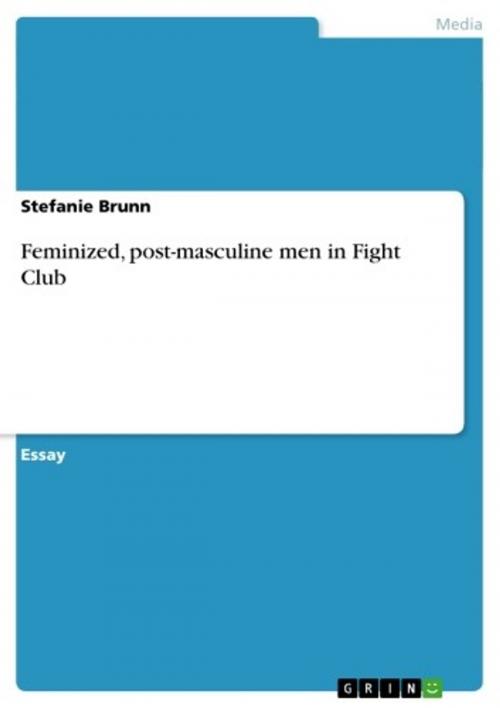| Author: | Stefanie Brunn | ISBN: | 9783640207572 |
| Publisher: | GRIN Verlag | Publication: | November 6, 2008 |
| Imprint: | GRIN Verlag | Language: | English |
| Author: | Stefanie Brunn |
| ISBN: | 9783640207572 |
| Publisher: | GRIN Verlag |
| Publication: | November 6, 2008 |
| Imprint: | GRIN Verlag |
| Language: | English |
Essay from the year 2008 in the subject Film Science, grade: 1,0, Humboldt-University of Berlin (Anglistik / Amerikanistik), course: Postmodern Cinema, 13 entries in the bibliography, language: English, abstract: David Fincher's movie Fight Club (1999)1 provoked a lot of debates because of its explicit depictions of violence, the representation of a mental disease, called Dissociative Identity Disorder (DID), and its questioning of today's masculine role. The latter is a very interesting theme to which I will dedicate this essay. In the following, I will show and analyze the representation of the feminized, post-masculine men in Fight Club. Firstly, I will concern myself with the causes of this emasculation. Directionless and without any real-life role-models or strong father figure, without any wars or enemies, men in Fight Club are drawn to consumer society to find a new focus in their lives. But consumerism feminizes men's bodies and pushes them more and more into a female sphere. Secondly, the effects of this feminization will be analyzed. Men want to re-masculinize their bodies and try to achieve this through a traditionally masculine way: violence. But even aggressive behaviour does not rescue them from their feminized self, as deriving pleasure from a fight involves both parts a sadistic, male and a masochistic, feminine one.
Essay from the year 2008 in the subject Film Science, grade: 1,0, Humboldt-University of Berlin (Anglistik / Amerikanistik), course: Postmodern Cinema, 13 entries in the bibliography, language: English, abstract: David Fincher's movie Fight Club (1999)1 provoked a lot of debates because of its explicit depictions of violence, the representation of a mental disease, called Dissociative Identity Disorder (DID), and its questioning of today's masculine role. The latter is a very interesting theme to which I will dedicate this essay. In the following, I will show and analyze the representation of the feminized, post-masculine men in Fight Club. Firstly, I will concern myself with the causes of this emasculation. Directionless and without any real-life role-models or strong father figure, without any wars or enemies, men in Fight Club are drawn to consumer society to find a new focus in their lives. But consumerism feminizes men's bodies and pushes them more and more into a female sphere. Secondly, the effects of this feminization will be analyzed. Men want to re-masculinize their bodies and try to achieve this through a traditionally masculine way: violence. But even aggressive behaviour does not rescue them from their feminized self, as deriving pleasure from a fight involves both parts a sadistic, male and a masochistic, feminine one.















